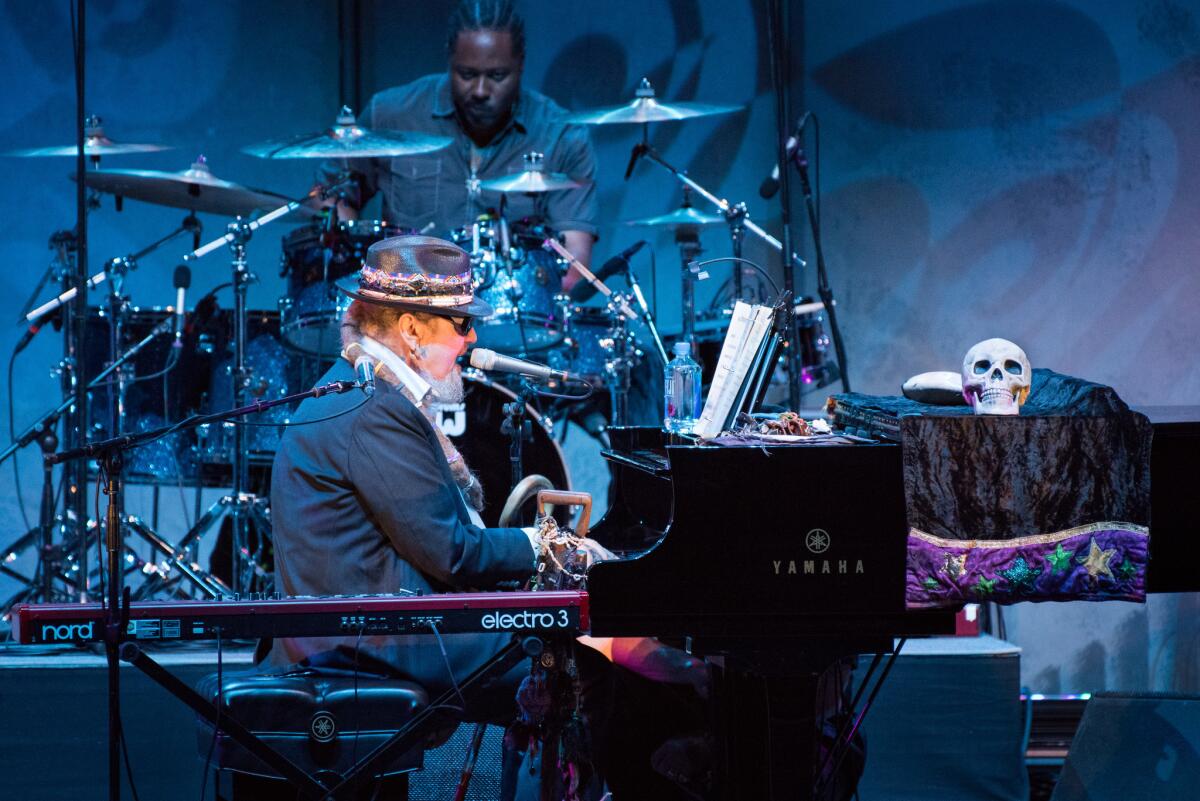Review: New Orleans music giant Allen Toussaint saluted in style at Hollywood Bowl

- Share via
The word “salute” in “Yes We Can Can: An Allen Toussaint Salute at the Hollywood Bowl” served more as a low-key theme than a specific call to action in the performances by Toussaint’s musical family from New Orleans: Dr. John, Irma Thomas, Cyril Neville, Galactic and the Allen Toussaint Band.
There were few testimonial speeches Wednesday at the Bowl, little direct lionizing of the Crescent City pianist, songwriter, producer and arranger, even though the influence he exerted over a six-decade career runs far and wide. That’s most likely the way Toussaint, who died at 77 in November, just after a concert performance in Barcelona, Spain, would have wanted it.
Although he was astonishingly talented in multiple facets of the music business, Toussaint was known to those closest to him as an unfailingly humble human being, one who always preferred to shine the spotlight on other artists he worked with on their recording sessions.
In keeping with that attitude, the evening’s participants paid homage to Toussaint not so much by praising him, but by sharing his music with a near-capacity crowd in the first show of the summer’s “Jazz at the Bowl” series.
Toussaint, it should be noted, always shied from referring to himself as a jazz musician, instead always aligning himself with the colorful school of New Orleans R&B, in particular the piano tradition of such predecessors and peers as Professor Longhair, James Booker, Huey “Piano” Smith, Tuts Washington and, the show’s headliner, Dr. John, a.k.a. Mac Rebennack.
“Here’s one that Allen writ for me personably,” Dr. John said by way of introducing “Go Tell the People,” using his characteristically fractured syntax.
Dr. John was accompanied by his four-piece band, the Nite Trippers, and largely focused on Toussaint’s songs rather than his own deep song catalog, offering up “Working in the Coal Mine,” the song that Lee Dorsey turned into a Top 10 hit in 1966, “Get Out of My Life Woman” and one of Toussaint’s signature numbers, the irresistibly roiling “Brickyard Blues.”
“He was my partner,” Dr. John, 75, said softly from his seat at a grand piano, “and he will always be my partner.”
He capped his portion of the show by singing his two biggest hits, “Right Place, Wrong Time” and “Such a Night,” noting for the crowd that both were produced by Toussaint. Those early-’70s hits established Dr. John’s solo career following more than a decade as an in-demand session pianist and guitarist himself.
It was during “Such a Night” that Dr. John made his musical kinship with Toussaint inescapable as he took two piano breaks in which he effortlessly reeled off a staggeringly complex progression of melodic ideas, accompanying chords and percussive rhythmic accents that have been a core attribute of New Orleans music for more than a century, reaching back to the innovative music of Creole pianist and composer Louis Gottschalk.
Preceding Dr. John’s set, Irma Thomas joined the Allen Toussaint band for a too-brief three-song set-within-their-set, applying her gorgeously smoky voice to “Two Winters Long,” “Ruler of My Heart” (which Otis Redding sang in slightly revised form as “Pain in My Heart” a year after Thomas recorded it in 1963) and “Old Records.”
The latter is one of many songs Toussaint wrote testifying to the joy and power of music, and Thomas sang lovingly of the solace music can offer a broken heart: “Night time finds me counting diamonds in the sky / Then I turn on my stereo with the volume intimately low / It’s so good listening to old records and thinking about you.”
Cyril Neville, of the Neville Brothers, the first family of New Orleans R&B, delivered one of the evening’s most resonant performances in his reading of Toussaint’s sociopolitically minded song “Freedom for the Stallion.”
Although Toussaint is rightly associated with the festive mood of many upbeat hits he wrote or produced for others, among them LaBelle’s “Lady Marmalade,” the Pointer Sisters’ “Yes We Can Can,” Glen Campbell’s “Southern Nights” and Ernie K-Doe’s whimsical “Mother-in-Law,” life as an African American in the Deep South didn’t escape his attention as a songwriter.
“Some sing a sad song/Some got to moan the blues,” Neville sang plaintively, “Trying to make the best of a home/That the man didn’t even get to choose.” Perhaps the biggest testament to Toussaint’s character was that he never sank into despair or bitterness, instead always turning to music as both refuge and curative for the ills of an often-discordant world.
It’s a sign of the depth of New Orleans’ musical tradition that funk-R&B band Galactic, which is marking its 20th year as a unit this year, represented the new kids on the block at Wednesday’s show.
The six-piece outfit is thoroughly steeped in the second-line parade rhythms and swampy grooves of southwestern Louisiana music, and was joined for several numbers by singer Erica Falls, a former member of Toussaint’s band.
She displayed unearthly purity of tone and a haunting bird-like vocalese ability that employed her voice much like just another instrument alongside Galactic’s guitar-bass-trombone-keyboard-drums foundation.
Follow @RandyLewis2 on Twitter.com
For Classic Rock coverage, join us on Facebook
More to Read
The biggest entertainment stories
Get our big stories about Hollywood, film, television, music, arts, culture and more right in your inbox as soon as they publish.
You may occasionally receive promotional content from the Los Angeles Times.










